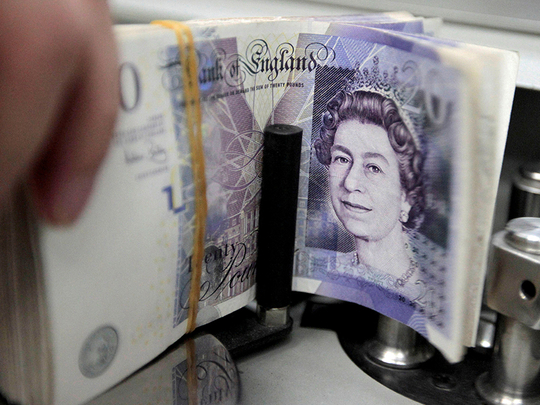
Edinburgh: The pound risks turning from prop to pain for the UK economy as Brexit negotiations near.
Sterling tumbled the most last week since the vote to leave the European Union in June, as investors woke up to the fact that the UK government’s approach to Brexit may mean forgoing access to the single market. While the currency’s weakness has helped cushion the economy in the immediate aftermath of the referendum, the latest slide may carry more costs than advantages.
The drop caused companies to downgrade profit forecasts, threatened to fan inflation, and also hinted at a further fall from grace for what was once the global reserve currency. The flash crash last week was more redolent of a frontier currency than the world’s fourth-most traded, and only Sierra Leone’s leone and the Mozambique metical have dropped more than the pound since the June 23 referendum.
While a weaker currency can give exporters a boost, those advantages can disappear when the slide is as fast and disorderly as sterling suffered last week, according to Nomura Holdings Inc. The pound’s 16 per cent tumble against the dollar since Brexit may be part of a fundamental shift in the state of the UK economy that monetary policy alone can’t tackle, former Bank of England policymaker Adam Posen said on Friday.
Economic impact
“It’s a really a question of pace as much as a level,” said Bilal Hafeez, global head of foreign-exchange research at Nomura in London. “The key thing is the need for more stabilisation, or less sharp moves. But if it continues at this pace it could have a negative feedback loop.”
The impact of the declining pound has been filtering through since the vote. Manufacturing has been supported by a weaker sterling, the exporter-heavy FTSE 100 index approached a record high, while import prices have jumped. As the plunge accelerated during the ruling Conservative Party’s conference last week, the wider fallout became apparent. Sports Direct International Plc announced losses on its currency hedge were forcing it to scrap the profit forecast issued just a month ago. Bond-market expectations for faster inflation soared.
The disruptive impact from a sudden currency depreciation may be so large that it exceeds the economic benefits that accrue from higher exports, according to Commerzbank. For consumers already noticing the higher cost of foreign travel, the risk is that a weaker currency results in price rises at home, while faster inflation may make it less likely that the Bank of England will be able to support a slowing economy via lower interest rates or more asset purchases — increasing the risk of stagflation.
“The events of the past week probably provide a window into the sort of volatile economic environment the UK will face over at least the next two-and-a-half years,” said Rob Wood, an economist at Bank of America Merrill Lynch in London. “That environment is unlikely going to be good for growth.”
World’s worst
Sterling, 2016’s worst performer among 32 major currencies tracked by Bloomberg, has plunged as the potential has become more real for a so-called hard Brexit that would see the UK settling for restricted access to the EU’s single market — the largest in the world — in return for the government retaking control of immigration.
With the exact meaning of Brexit still unclear, traders are expecting more volatility. Prime Minister Theresa May has pledged to trigger Article 50 of the Lisbon Treaty, the formal step needed to leave the bloc, by the end of March 2017. That would start two years of formal discussions on an exit.
Sterling slid 1.4 per cent to $1.2434 on Friday after touching a 31-year low of $1.1841, according to composite prices compiled by Bloomberg of contributions from dealers. The drop of 4.2 per cent in the week was the most since that ending June 24, when the Brexit vote results were published. The pound also had it worst week since 2009 versus the euro.
Investors alarmed by the possibility of tougher immigration curbs that could make it costlier to produce goods and secure talent are also fretting about the country’s record current-account deficit, which needs to be funded by a constant flow of foreign cash.
Wealth effect
While a weaker currency may boost exports in the short term, “on the other side you have a negative wealth effect because you are giving away your exports for much less and you have to pay more for your imports,” said Ulrich Leuchtmann, head of currency strategy at Commerzbank in Frankfurt. “At some point this wealth effect is dominating and the net effect on the real economy is a negative one.”
With a friendly divorce between the UK and its EU partners looking more remote, HSBC Holdings Plc, Europe’s largest bank, said the pound’s slide is far from finished and predicts a slide to $1.10 (Dh4.04) by the end of 2017.
Sterling “has gone from a cyclical to a political and structural currency,” David Bloom, global head of currency strategy at HSBC in London, said in a report to clients. “The structure and politics are conducive to a currency that needs to fall to a level that causes balance” and that is “still a lot lower than where it is today,” he wrote.











